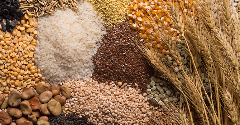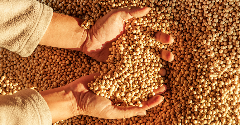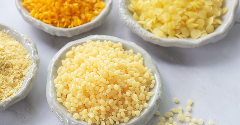News
Arjuna Natural publishes amla study
18 Mar 2019A newly published study is said to demonstrate the efficacy and safety of Tri-Low full extract of amla (Phyllanthus emblica), the Indian gooseberry, in alleviating dyslipidemia.

A newly published study is said to demonstrate the efficacy and safety of Tri-Low full extract of amla (Phyllanthus emblica), the Indian gooseberry, in alleviating dyslipidemia, a leading contributing risk factor to the development of atherosclerosis.
The amla extract is said to have shown significant potential in reducing total cholesterol and triglyceride levels and in stimulating a more favourable balance of lipid ratios. These results, says Arjuna Natural, confirm Tri-Low’s functionality as a superior, clean-label cardiac health supplement. In the double-blind, placebo-controlled, multicentre clinical trial, 500 mg amla extract or a matching placebo capsule was administered to 98 dyslipidemia patients twice daily for 12 weeks. Following the 12-week trial, major lipids including total cholesterol, triglycerides, LDL cholesterol and VLDL were significantly lower in the amla group compared to the placebo group. At the same time, anti-atherogenic lipoproteins, such as HDL-cholesterol, were maintained at optimum levels. A 39% reduction in atherogenic index of the plasma (AIP) – a key indicator of cardiac health — also was noted in the amla group.Lipid balance was achieved with no concomitant reduction of plasma CoQ10 levels, a phenomenon typically associated with a number of lipid-lowering drugs. Other related parameters, such as fasting blood glucose, homocysteine levels, and apo-B/apo lipoprotein levels, also tended to lower. This potentially widens Tri-low’s scope for targeting diabetic dyslipidemia.Tri-Low delivers the full spectrum of bioactive ingredients extracted from wild, fresh, ripe Indian gooseberry fruit (Phyllanthus emblica aka amla). It is the first of its kind standardized with diacylglycerides of ALA Linolenic acid (an omega-3 fatty acid) and polyphenols.“The toxic combination of high cholesterol, stress of modern life, and the wide availability of junk food are factors that are known to aggravate cardiovascular diseases,” said Benny Anthony, Joint Managing Director of Arjuna. “The sacred Indian gooseberry, or ‘amla’, has been used for centuries in many Ayurvedic formulations as a Rasayanic, something known for its all-around health benefits and outstanding safety. Today we are increasingly realizing its place as an all-powerful cardiac protector — even in stubborn cases of unhealthy lipid profiles. Arjuna offers the same nutraceutical in an improved, more bioactive, and highly concentrated form.”Arjuna says that its unique and proprietary, gentle extraction process preserves ingredient functionality and ensures potency. Amla extracts typically are manufactured from dried amla and can differ fundamentally from Tri-Low in quality and activity. In fact, this is the first study that noted the presence of omega-3 fatty acids in amla extract.The patented product is available in powder form and can be used straight or in combination with other cardiovascular health supplements.Related news

BelliWelli secures funding for retail and team expansion
2 Jan 2025
US fibre brand BelliWelli has confirmed a further $10 million series B investment from Invus. The investment will help the company further expand its presence in the US.
Read more
EU calls to harmonise allergen labelling increase
1 Jan 2025
Allergy awareness efforts focus on implementing a European reference laboratory and collaboration to standardise labels and support allergen identification.
Read more
Japanese study points to risk of excessive nutritional fortification
31 Dec 2024
Fortified foods and supplements are mainly beneficial but there is a small risk of over-supplementation – particularly for vitamin B6, a Japanese study has concluded.
Read more
Is it time for a global definition of whole grain?
30 Dec 2024
Amid a lack of harmonisation, the European Food Information Council (EUFIC) is calling for a global definition of the term whole grain to end consumer confusion.
Read more
EFSA publishes new food additive research on non-nutritive sweetener saccharine
27 Dec 2024
The European Food Safety Authority (EFSA) has released new recommendations on saccharin and its sodium, potassium and calcium salts (E 954) as food additives.
Read more
FDA delivers workshop on nutrition regulation and science
19 Dec 2024
The FDA hosted a nutrition regulatory science workshop exploring ultra-processed foods and emerging technologies, aiming to spotlight the relationship between nutrition, science, and evidence-based policies.
Read more
How US soy exports shape Southeast Asian food
19 Dec 2024
As Southeast Asia and the US mark 20 years of trade, trends in soy, especially plant-based preferences, signal increasing demand for high-quality protein sources.
Read more
Hormel Foods sells its Health Labs brands to Lyons Magnus
17 Dec 2024
Hormel Foods has confirmed the sale of its Hormel Health Labs division to Lyons Magnus, creating Lyons Health Labs. The strategic move aims to better position Lyons Magnus as a leading player in the growing US market for nutritional and health products...
Read more
Nestlé releases products for pregnancy and fertility
13 Dec 2024
Building on in-house research, existing scientific evidence, and consumer demands, the global food company has developed products designed for mothers and babies.
Read more
Consumer awareness and transparency key factors in shift to natural-based emulsifiers
11 Dec 2024
The demand for natural-based emulsifiers in the food industry is surging as health concerns over the use of synthetic emulsifiers have consumers looking for alternatives.
Read more